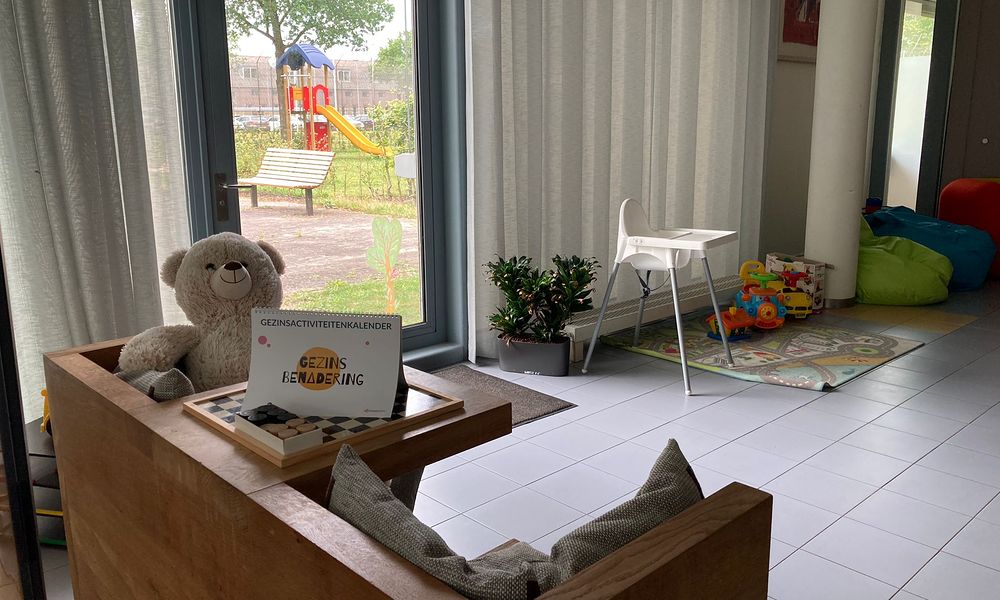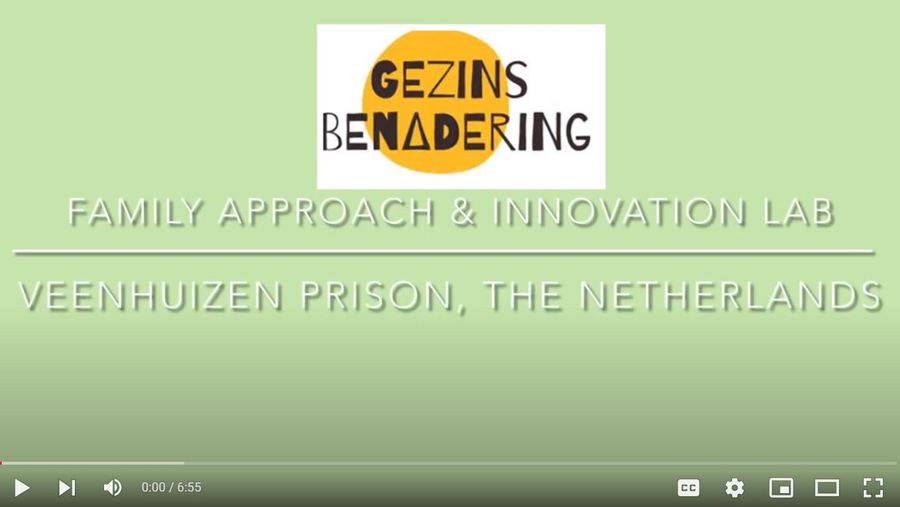
Research shows that children of fathers in prison are more likely to suffer from problems such as depression, anxiety disorders and poor results at school. Sometimes they develop problems that last into adulthood. If they have more contact with their father and see that he is doing well, it gives a child reassurance.
In the Netherlands, an estimated 25,000 children have a parent who is in prison. Some of these inmates are in the father's wing, a special section in a correctional facility for fathers. In prisons where there is a father's wing, there is also a family room where children can visit their father. More contact reduces the harm detention does to children, reduces recidivism and gives fathers a more realistic picture of the family situation after imprisonment. It is clear that the concept works well: in June 2023, a third father's wing was opened in the north of the Netherlands: Norgerhaven in Veenhuizen. Hanze students and students of the University of Groningen, who played and continue to play an important role in the creation of the father wing, were present at the opening.
Practical products made by students
Originally, the idea for the father's wing came from HMP Parc Prison, Bridgend, Wales, where good results were achieved with a special section for fathers within the prison. Hanze teacher and researcher Petrick Glasbergen and various professionals from the professional practice went to see for themselves and came back inspired. Further research was carried out into what was needed to achieve such a set-up in the Netherlands, and students were also involved in this. Hanze students started their internship in Parc Prison, after which they spent the second half of their internship in Veenhuizen or Leeuwarden. After years of preparation, the first father wings were opened in 2018 in Veenhuizen, Esserheem and Leeuwarden.
Hanze researcher Simon Venema is doing his PhD research on the father's wing, which he hopes to complete later this year. His research can lay a foundation for the family approach in the Netherlands. He collaborates with Hanze students and students from the University of Groningen, who are involved in both the research and the development of the practical products that form the foundation of the father’s wing. For his PhD research, Simon is part of the Living Lab Family Approach.
Fathers are trained for the father’s wing
If a father in prison qualifies to become part of the father's wing, he receives training. Before that happens, the type of offence he has committed is looked at and it is also important whether the mother gives permission. If the father is selected to participate in the project, he must be prepared well. This is done through training courses such as 'Fathers in the role of father' and 'Return to the family', which were developed by Hanze students and students from the University of Groningen. Within the Living Lab, they worked together with the professionals of Family Approach in the Veenhuizen. Hanze student of Applied Psychology Fardau van der Mark started working on it last school year. Fardau: 'The aim of the training is to prepare fathers for how they can resume their role as fathers in detention and how to get the most out of the father's wing. Basically, the training courses were already there, developed by students who came before me. The intention is that the product, as we call the training, will then be further developed. So I started talking to the professionals of the prison in Veenhuizen and that's how we optimised the training in co-creation. We then look at what is there, what is already working and what can be improved. When the training is almost finished, we will test it in practice. In order to do this, I went to Esserheem several times to talk to detainees. We tested the training with four fathers from the father's wing. This way you get immediate responses and feedback. This co-creation makes sure you come up with a good product that you know will work.'
Children get something to hold on to
Like Fardau, students Kyra Ferbeek (Applied Psychology, Hanze) and Petra de Raad (Clinical Forensic Psychology & Victimology, University of Groningen) regularly visited the correctional facility in Veenhuizen to work on the further development of other products used there. Kyra is writing her thesis on the return to the family after detention, for which she interviewed several fathers in addition to a wide range of professionals. Kyra: 'There are two pillars that they have to take into account. The first is the realisation that the family moves on while they are inside. The situation has changed and you won't be able to just go back. The other is the structure that the prison provides. There are many more stimuli in a family than in their ordered life in prison and it is good to be aware of that.'
Petra de Raad worked on a booklet with descriptions and photos of the prison, the environment and the cells where the fathers are held. This will be sent to the children at home in preparation for their first visit. Petra: 'We have also made a walk-through route within the correctional facility for the children, in which it is clearly indicated how they should get to their dad. A first visit to prison, in particular, can be quite intimidating for a child. So it's nice that they can already prepare themselves a bit with a booklet. And in the prison itself, the route gives them something to hold on to.'
The aim is for the father's wing to become government policy
A total of 180 students from various disciplines, mostly from the Hanze, have been involved since the beginning of the Living Lab Family Approach. They come from the Applied Psychology programmes; Communication & Multimedia Design; Social Legal Services, Social Work and the University of Groningen and are supported by the research group Addiction Studies by Professor Eric Blaauw and researchers Petrick Glasbergen and Simon Venema.
An important part of the quality assurance and the communication of academic and practice-based research is the website www.gezinsbenadering.nl. This was developed by a CMD student. All products, such as academic articles, research reports, models, posters, workbooks, workshops and training courses on Family Approach, can be found here. They are all aimed at the connection between father and child, making prisons child-friendly and the eventual reintegration of the prisoner. Through presentations to other prisons and to politicians, we hope that the word will spread and the message will reach more and more people, so that every prison in the Netherlands will do something to support the children of their inmates. In any case, the Living Lab will continue for another two years with the aim that this will become national policy. Several correctional facilities and of course many students will be involved in this.
Project leader Petrick Glasbergen: 'The students have played a crucial role in the development of the family programme. The data they collected for the articles and the products they created in co-creation with the target group, professionals and researchers form a foundation for the project. So you can say that their creativity and ideas have helped to make the father's wing what it is. The professionals of Family Approach in Esserheem and Norgerhaven are very happy with the work the students did. Without them, there would be no data collection, no products and no development-oriented family approach. Basically there would be no father's wing.'
The students all work on their individual research, but they also exchange a lot of information and practical experiences with each other. With each other, but also with the students of previous semesters. For example, they made use of each other's research and bibliographies, and they supported and motivated each other when things were not going so well. Fardau: 'New students come each semester, all with a fresh perspective, and that's a good thing.' With this creative cross-pollination, the students create impact in the form of information and products, but also innovative power within the Penitentiary and a culture change. The way in which this Living Lab is intertwined with the professional practice is in line with the educational vision of the Hanze. At the same time, it is a unique place within the international prison landscape. It's no coincidence that the collaboration won the Prison Achievement Award in 2022.
The fathers are the experts by experience
The father's wing showcases the interaction between practice, research and education. 'Our conversations with the fathers in the father's wing were crucial,' says Kyra. 'In the end, they are the experts by experience. Their stories helped us understand how complicated it is to be a father in prison and that helped us a lot.'
'We also made a lot of use of Simon Venema's research,' Petra adds. 'He gave us a lot of sources and his research gave us a lot of insights. Conversely, he has also been able to use our work for his research. This is how we can help each other out.'
The students visited the PI Esserheem regularly to talk to the prisoners. 'You don't always know what people have done,' says Fardau, 'but sometimes they volunteer to tell their story. A lot of people have the idea that you can't just talk to an inmate, but I never felt unsafe there. Everyone was always very open. We often heard, 'would you like to take a look at my cell?'
PI Veenhuizen

Lees meer
Verslavingskunde en Forensische ZorgFeedback component
How satisfied are you with the information on this page?




